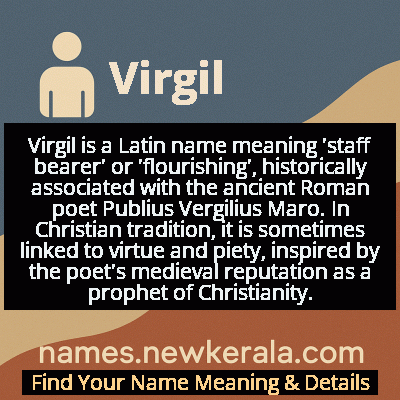Virgil Name Meaning & Details
Origin, Popularity, Numerology Analysis & Name Meaning of Virgil
Discover the origin, meaning, and cultural significance of the name VIRGIL. Delve into its historical roots and explore the lasting impact it has had on communities and traditions.
Name
Virgil
Gender
Male
Origin
Christian
Lucky Number
5
Meaning of the Name - Virgil
Virgil is a Latin name meaning 'staff bearer' or 'flourishing', historically associated with the ancient Roman poet Publius Vergilius Maro. In Christian tradition, it is sometimes linked to virtue and piety, inspired by the poet's medieval reputation as a prophet of Christianity.
Virgil - Complete Numerology Analysis
Your Numerology Number
Based on Pythagorean Numerology System
Ruling Planet
Mercury
Positive Nature
Adventurous, dynamic, curious, and social.
Negative Traits
Restless, impatient, inconsistent, prone to indulgence.
Lucky Colours
Green, white.
Lucky Days
Wednesday.
Lucky Stones
Emerald.
Harmony Numbers
1, 3, 9.
Best Suited Professions
Sales, marketing, travel, entertainment.
What People Like About You
Versatility, charisma, adventurous spirit.
Famous People Named Virgil
Virgil (Publius Vergilius Maro)
Poet-Philosopher
Authored the Aeneid, foundational epic of Western literature and Roman identity
Virgil Thomson
Composer
Pulitzer Prize-winning American composer and influential music critic
Virgil Abloh
Fashion Designer
Revolutionized luxury fashion as founder of Off-White and Louis Vuitton's first African-American artistic director
Virgil Grissom
Astronaut
NASA Mercury Seven astronaut, pioneer of American space exploration
Name Variations & International Equivalents
Click on blue names to explore their detailed meanings. Gray names with will be available soon.
Cultural & Historical Significance
Beyond literature, Virgil's influence extends to Christian tradition, where some medieval scholars interpreted his Fourth Eclogue as a prophecy of Christ's birth, earning him the nickname 'the Christian pagan.' This unique position between classical antiquity and Christian tradition makes Virgil one of the few pagan authors embraced by the Church. The name became particularly popular among early Christians, with several saints bearing the name, including Saint Virgil of Salzburg, an 8th-century Irish missionary and astronomer who became Bishop of Salzburg. Throughout Western history, the name Virgil has symbolized classical learning, poetic genius, and the bridge between ancient wisdom and Christian civilization.
Extended Personality Analysis
Individuals named Virgil are often perceived as intellectual, thoughtful, and possessing deep wisdom. The name's association with the great Roman poet creates expectations of creativity, eloquence, and philosophical depth. Virgils tend to be methodical and detail-oriented, reflecting the meticulous craftsmanship evident in Virgil's poetic works. They often exhibit a strong sense of duty and responsibility, mirroring Aeneas's pietas (duty to gods, family, and country) in the Aeneid. Many Virgils demonstrate quiet leadership qualities—not flashy or domineering, but steady and reliable, much like the poet who carefully shaped Roman identity through his writing.
There's often a contemplative quality to those bearing this name, suggesting someone who thinks deeply before acting and values tradition while still being innovative. The name carries an air of sophistication and classical education, often attracting individuals with interests in literature, history, or the arts. At the same time, modern Virgils like fashion designer Virgil Abloh demonstrate how the name can embody cutting-edge creativity and cultural innovation, showing that the name adapts while maintaining its core association with excellence and enduring influence. The combination of traditional wisdom and modern relevance makes Virgil a name associated with individuals who bridge different worlds and eras.
Modern Usage & Popularity
In contemporary times, Virgil has experienced a fascinating evolution in usage and perception. While never among the top 100 most popular names in recent decades, it maintains a steady presence, particularly among parents seeking classical names with intellectual and artistic connotations. According to Social Security Administration data, Virgil ranked around 900th in popularity in the United States in the 2020s, showing a slight resurgence as vintage names come back into fashion. The name's modern appeal has been significantly boosted by high-profile figures like Virgil Abloh, who brought the name into fashion and youth culture spheres. Contemporary usage often bridges the gap between traditional sophistication and modern creativity, making it attractive to parents in artistic, academic, or design-oriented communities. The name's strong Christian heritage continues to make it popular in religious families, while its classical roots appeal to those with interests in history and literature. In professional contexts, the name Virgil conveys seriousness and intelligence, often creating positive first impressions in academic, literary, or creative fields.
Symbolic & Spiritual Meanings
Symbolically, Virgil represents the enduring power of wisdom, tradition, and cultural continuity. The name embodies the concept of the guide or mentor—much like Virgil guiding Dante through the afterlife—symbolizing enlightenment, protection, and the transmission of knowledge across generations. As the author of Rome's national epic, the name carries connotations of foundation-building and cultural identity formation. The literal meaning 'flourishing' connects to growth, vitality, and the flourishing of civilization itself through art and literature. In Christian symbolism, Virgil represents the meeting point of pagan wisdom and divine truth, serving as a bridge between the classical world and Christian revelation. The name also symbolizes craftsmanship and perfectionism—Virgil was famously dissatisfied with the Aeneid and wanted it destroyed, representing the pursuit of artistic perfection. In modern contexts, Virgil has come to symbolize innovative tradition—the ability to honor classical roots while pushing creative boundaries, as demonstrated by figures like Virgil Abloh who transformed luxury fashion while acknowledging his namesake's legacy.

